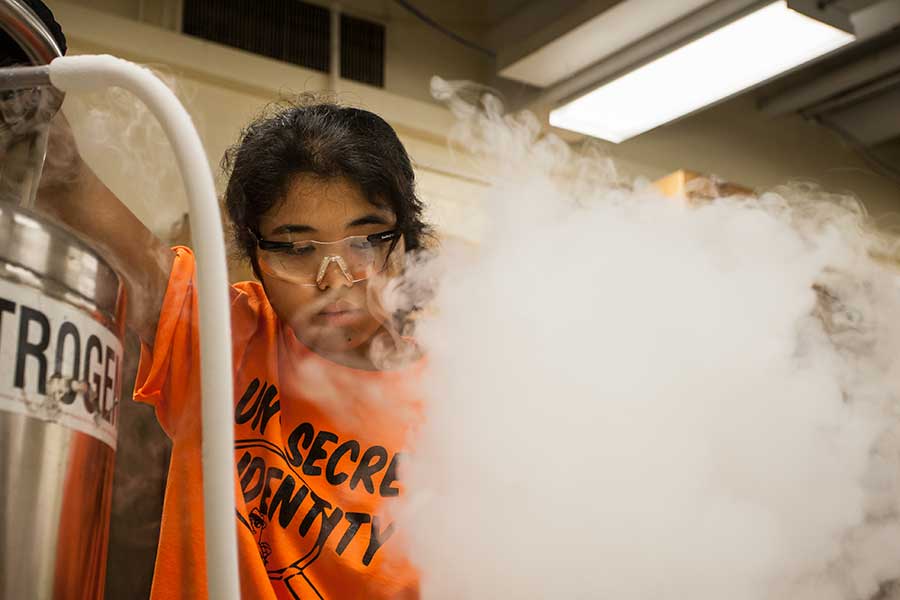

Venture Boldly

Office of Communications
2 East South Street
Galesburg, IL 61401


Marika Takemura's research, Synthesis and Characterization of Iron Catalyst Precursors to Support Redox-Active Ligands, is supervised by Professor Helen Hoyt and supported by the Glenn M. Nagel Undergraduate Research Fund Award in Chemistry and Biochemistry, the Richter Scholarship, and the Frank and Ruth Schmitt Student Research Award. Marika is a junior chemistry major from Cebu City, Philippines.
Tell us more about your research.
The research involves making new anhydrous compounds of iron complexes that promote green chemistry, and the biological relevance includes the production of biologically active compounds common to penicillin through the use of catalyst in a more efficient manner. The research began as a series of chemistry independent studies beginning winter term of my sophomore year, working around four hours with Professor Hoyt to strategize and learn new techniques and four hours on individual work.
What inspired you to pursue the project?
Considering all the hours I invested in this research during the winter and spring term as an independent study -- in between classes and meetings, late at night, and weekend sessions -- I don't think I was ready to be away from my lab for three months. I enjoy doing the experiments, modifying procedures, writing reports, presenting my research, wondering why such a method would not work, etc. Although tedious at times, research is always enjoyable. Whether or not I will pursue a future in industrial or green chemistry, I knew that the research experience would help me grow as a better scientist.
What has been the best part of your research so far?
The best part of my research experience is learning new lab techniques and methods that minimize water exposure to our compounds. These are techniques that I would not normally learn in undergraduate level chemistry courses. I am also honored to have the opportunity to learn how to use Knox's first glove box (a tool that allows all traces of oxygen, water, and other airborne solvents to be removed from compounds). In addition, having the choice of what to do in the lab, when to run reactions, and what new reactions to study makes me feel like a real scientist.
How did you learn about this opportunity?
Professor Hoyt has been a strong, influential faculty member in helping me become a better research scientist. This is actually her first year as an assistant professor at Knox, and I had an opportunity to know her when I was a TA for Tuesday evening general chemistry labs. After fall term 2011, she offered me the opportunity to work with her in her research and we've been rolling since then. She encouraged me to participate in Horizons and to apply for various science summer research fellowship grants during spring term.
Can you give an example of how your in-classroom and/or out-of-the-classroom experiences at Knox have benefited you in the project?
Organic Chemistry with Professor Diana Cermak was definitely a strong background to start off with research, even after only fulfilling Organic I at the beginning of research. Overall as "organizers" we were trained to write formal labs, to have good lab techniques, and to discuss the results of our experiment. Also, through my experience as a Red Room chemistry tutor, I learned that I enjoy sharing and talking about chemistry to both a small and large group of people. Thus, Horizons was a good event to remind me how much I enjoy sharing my research. During the summer, I was again able to do this for the summer research seminar series at Knox and to six visiting students from Monmouth College.
How do you think this experience will benefit you in the future?
This experience is definitely helping me become a better research scientist. As an undergraduate student I am honored to work with Professor Hoyt and the Chemistry Department to learn techniques that are normally taught in graduate studies. I have thus decided to pursue this research as an Honors project and hopefully become a medical research scientist through an M.D.-Ph.D. program. With the combination of lab work, seminars, talks, and literature search, I am having a taste of what graduate school in chemistry would be like. Whether or not, the M.D.-Ph.D. program will happen, I enjoy working in the lab and sharing my research. During my junior year, Professor Hoyt and I plan to present our research in the Midwest Undergraduate Research Conference, of which I am eager to participate in.
Published on July 30, 2012